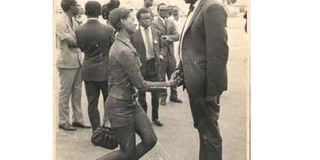Prime
Idi Amin decrees on mini-skirts, gonorrhoea and wigs

President Amin is greeted by Princess Elizabeth Bagaya of Tooro in the 1970s.
Earlier on February 2, Amin had signed a proclamation removing president Milton Obote and his ministers from office as well as from Parliament.
Paragraph two of the proclamation read: “All the titles, privileges, prerogative, powers, functions and exemptions formerly enjoyed or exercised by the former president of the Republic of Uganda under the Constitution are hereby vested in me with effect from the January 25, 1971, and accordingly, the head of State shall be the commander-in-chief of the armed forces.”
Paragraph three read: “Parliament is hereby dissolved and all legislative powers referred to in the Constitution are hereby vested in me.”
The fourth paragraph instructed: “All legislative powers shall be exercised by me through the proclamation of decrees evidenced in writing under my hand and sealed with the public seal.”
Decree on wigs
On February 1, 1974, a decree that outlawed the wearing of wigs was signed by president Amin, according to a press statement.
After signing the decree, Amin said he had come under pressure from Ugandan elders to act on women wearing wigs, trousers and long skirts with deep slits.
However, the statement said what prompted him to sign the decree was after he had learnt that wigs craved for by the Ugandan women were made by callous imperialists from human hair, mainly collected from the unfortunate and miserable victims of the Vietnam war, thus turning human tragedy into lucrative commercial enterprise.
The statement read: “Wigs had generated a number of ailments. Wigs harbour articles injurious to life; from lice to lizards. Wigs promote health hazard besides making our women look un-African and artificial.”
The decree, according to the press statement, did affect not court judges, lawyers or other persons whose occupation, profession, official function, cultural, theatrical or sports required them to wear a wig.
On the same day, Amin signed another decree permitting town clerks to register customary marriage previously registered by the sub-county chiefs.
The decree banning women from wearing trousers and long skirts was also signed on the same day. Only women in the armed forces were allowed to wear trousers in public, but only when on duty.
Decree No. 11 of 1971
The decree prohibited three or more persons travelling together at night while carrying offensive weapons.
The decree stipulated that where three or more persons are found loitering, wandering, moving about or concealing themselves whilst one of them is armed with an article which is dangerous or offensive or housebreaking equipment of any kind, such a person shall be presumed to have an interest to commit an offence relating to property or an offence against a person, and upon conviction shall be guilty of felony and shall be liable for imprisonment for seven years.
Decree on the jobless
In early April 1977, Amin signed a law popularly known as the decree of the jobless. The decree dealt with two categories of people; the vagrants (bayaye) and the unemployed.
The law amended the Community Farm Settlement Decree of 1975. Under this decree, any person who was unemployed, but able-bodied and aged between 16 and 40 years may be trained on a farm or, in an industry for a period of 12 months. And after the training, he would be settled on land.
On the vagrant persons, under the decree, any person found by an authorised officer wandering about without any visible means of subsistence, and unable to render a satisfactory account of him or herself, e.g. has no relevant graduated tax ticket or genuine school or employment identity card and has no parent, guardian or relative near, could also be trained on a farm or industry.
Parents with children who could be classified as difficult cases could also send them for training.
However, young persons between 12 and 16 years must be trained separately, the decree emphasised.
Only members of the military police, police force and the prison service or other authorised persons such as ministers, district commissioners, and gombolola chiefs were allowed to effect the arrest.
Decree on hoarding
On February 20, 1974, president Amin signed the decree prohibiting hoarding of goods. Under the decree, a person is guilty of hoarding if, while having any essential goods to sell, including farm produce, he or she falsely denies that he or she has less such goods or refuses without reasonable cause to sell those goods or, does not make any reasonable effort to sell them.
Upon conviction of the offence, the fine carried a maximum penalty of Shs20,000 or three years of imprisonment. Members of the police force not below the rank of inspector, members of the military police not below the rank of 2nd Lieutenant, all chiefs and town agents as well as produce inspectors and all persons under the Distribution and Price of Government Act were authorised to enter and search any business premises for hoarded goods.
Authorised officers could, however, enter a place for searching when in possession of proper identification and only during official working hours. Private homes could be searched if a court warrants was issued.
Decree on minerals exportation
On February 25, 1975, the president signed this decree prohibiting the exportation of copper from Uganda.
This decree was propagated after president Amin visited the Kilembe Copper Mines in Kasese in western Uganda and found that a lot of copper was being exported and yet Uganda was not benefitting from the revenue generated.
In part, the decree read: “This hereby prohibits the exportation from Uganda of any minerals specified in the schedule to this decree, hereinafter referred to as “scheduled mineral” without the licence from the minister. The minister may by statutory order amend the scheduled to this decree.”
Upon signing the decree, Amin also assumed the chairmanship of Kilembe Copper Mines Limited.
Decree on mini-dress
On June 5, 1972, president Amin signed the infamous decree prohibiting the wearing of mini-dress in public.
The decree banned the wearing of mini-skirts, hot pants and maxi dress with a V-shaped split. Women were prohibited from wearing a skirt or dress measuring more than three inches above the knee line.
The Sunday Monitor was not able to obtain particulars of the decree such as punishment, powers to arrest, among others.
However, we obtained information about the first culprit, Ms Harriet Nankumbi, who was 20 years old at the time.
On June 9, 1972, Nankumbi was arrested from Main Street in Jinja Town. The following day, Nankumbi, a currency examiner working with the Uganda Currency Board Jinja branch, was arraigned before the Jinja Chief Magistrates Court.
The deputy inspector of police who led the prosecution told court that on June 9, 1972, along Main Street the accused publicly conducted herself in manner likely to cause breach of peace.
However, a plea of not guilty was entered on Nankumbi’s behalf as the magistrate said he had not received a copy of the decree.
While in court, Nankumbi stood in the dock dressed in a red skirt, white blouse and grey pull-over. Measurements of her skirt were taken and the court found that it was more than three inches above the knee line.
The Voice of Uganda newspaper of June 10, 1972, reported that Nankumbi was due to reappear in court on June 1972. We were able to establish whether she was convicted or not.
Decree on the acquired Asian business
On October 6, 1972, president Amin signed decree 27 of 1972, popularly known as the Acquired Asian Business (Rights and Assortment).
On December 8, 1973, it was amended. The decree affected persons who government allocated businesses hitherto belonging to the Asians (Indians) who were in 1972 expelled from Uganda.
For instance, section (18) of the decree prohibited anyone who had been allocated business from imposing conditions less favourable than those which existed before the departure of the Asian, such as rent or prices and fees.
Another tough provision of the decree prohibited the transfer of property after October 6, 1972. Section (1) deterred the new owner from transferring the property or assets previously owned by the expelled Asians to any other persons.
This law was again amended in decree 29 of 1972. The amendment gave the Abandoned Property Custodian Board power to manage them for the public. It was after the amendment that T.M Buchanayanda and P. Otim were appointed to manage the Uganda Sugar Industry and Kinyara in Bunyoro.
Decree on venereal diseases
On September 17, 1977, a week after Amin had been discharged from Mulago National Referral Hospital, he signed the venereal disease decree.
One of the provisions of the decree stated: “A medical officer or a chief not below the rank of sub-county chief may direct any person who he reasonably suspects to have venereal disease to be medically examined in order to find out whether that person has the disease or not.”
Another clause said: “It will be an offence for a person to refuse to obey that order concerning medical examination. It will be an offence; for a person to unlawfully or negligently do any act which he knows or has reason to believe to be likely to spread the infection of venereal disease; for a person while suffering from a venereal disease other than a disease certified by the medical officer to be incurable, to knowingly harbour such a disease; for a person while detained at a place of treatment to leave such a place without a letter of discharge from the medical officer; for a person to wilfully contaminate any other person with the a foresaid disease; and any person who has the disease must name his or her contact, so that the contact may also be treated.”
Upon conviction, a person would be liable to a penalty not exceeding Shs2,000 or a term of imprisonment not exceeding six months. The court may also require the person to meet the costs incurred in the treatment of him or herself or the person he or she infected.
About Amin
Idi Amin Dada was the third president of Uganda, ruling from 1971 to 1979. Amin joined the British colonial regiment, the King’s African Rifles, in 1946, serving in Kenya and Uganda.
Eventually, Amin held the rank of major general in the post-colonial Ugandan Army and became its commander before seizing power in the military coup of January 1971, deposing Milton Obote. He later promoted himself to Field Marshal while he was the head of state.
During his years in power, Amin shifted in allegiance from being a pro-Western ruler enjoying considerable Israeli support to being backed by Libya’s Muammar Gaddafi, Zaire’s Mobutu Sese Seko, the Soviet Union, and East Germany.
Source: wikipedia.org




